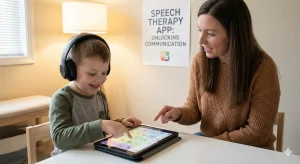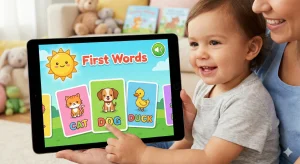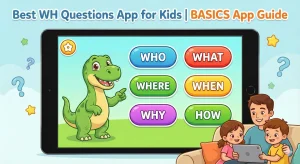Mental Health and Relationships: Understanding the Connection
By Prapoorna M
Last Updated: February 27, 2024
In our journey through life, the relationships we cultivate play a pivotal role, not just in our social lives but also in shaping our mental health. The intertwining of these two aspects of our lives is profound yet often overlooked. This intricate connection between mental health and relationships is what we will explore in this article.
The health of our relationships can significantly impact our emotional and psychological well-being. Whether it’s the joyous bonds we share with friends and family or the more complex dynamics of romantic partnerships, each interaction has the potential to influence our mental state. Similarly, our mental health can affect how we relate to others, the quality of our interactions, and our capacity to form and maintain healthy relationships.
The Interconnected Nature of Mental Health and Relationships
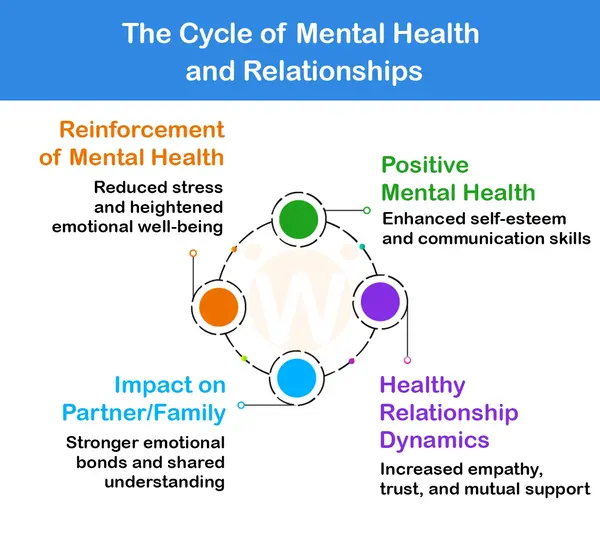
The dynamic between our mental health and relationships is a two-way street. On one hand, the state of our mental health can significantly influence the quality and depth of our relationships. On the other, the health of our relationships can either bolster or hinder our mental well-being. This intricate interplay is pivotal in understanding the role of “mental health in relationships” and “how mental health affects relationships.”
Men facing relationship challenges can benefit from our specialized Online Counseling for Men.
Mental Health Impacting Relationships
When we grapple with mental health challenges, it often reflects in our interactions and relationships. For instance, someone experiencing depression might withdraw from social engagements, impacting their connections with others. Anxiety can lead to excessive worries about relationship dynamics, creating tension and misunderstandings. This highlights the profound effect of our internal emotional and psychological state on how we connect and communicate with those around us.
Relationships Influencing Mental Health
Conversely, the nature of our relationships can have a profound impact on our mental health. Supportive, understanding relationships can be a source of comfort and resilience, helping us navigate through tough mental health periods. Toxic or strained relationships, however, can exacerbate mental health issues, leading to increased stress, anxiety, and even depression.
Discover how online relationship counseling can help you navigate the complexities of your personal connections.
Causes of Relationship Issues and Their Impact on Mental Health
Communication Impairment
Effective communication is the backbone of any healthy relationship. When communication falters, misunderstandings and conflicts arise, potentially leading to mental health challenges like stress and anxiety. This is especially true in intimate partnerships where a lack of clear, empathetic communication can create a chasm, leaving both parties feeling misunderstood and emotionally distressed.
Learn more: How to deal with lies in a Relationship?
Reliance and Cheating
Issues of trust, including infidelity, shake the very foundation of a relationship. The emotional impact of such breaches of trust can be profound, often resulting in anxiety, depression, and a significant blow to self-esteem. These experiences can leave lasting scars, affecting future relationships and mental health.
Boundary Deficiency
Setting and respecting boundaries is crucial in any relationship. A lack of healthy boundaries can lead to feelings of being overwhelmed or neglected. When boundaries are not clearly defined or respected, it can lead to stress and emotional turmoil, affecting our “emotional well-being and relationships” and “mental balance and intimacy.”
Conflict of Interests
Discrepancies in values, interests, or life goals can create sustained tension in a relationship. This ongoing conflict can lead to feelings of frustration and unhappiness, impacting mental health. It’s essential to navigate these differences with understanding and compromise to maintain both relationship health and mental well-being.
Key Factors Affecting Mental Health in Relationships
| Factor | Description | Impact on Mental Health |
|---|---|---|
| Communication Quality | The level of openness, honesty, and understanding in exchanges between partners. | Directly affects emotional well-being. Poor communication can lead to stress and misunderstanding, while good communication can enhance relationship satisfaction. |
| Trust and Security | The feeling of safety and reliability in a relationship. | Essential for mental peace. Lack of trust can cause anxiety and insecurity, whereas a secure relationship promotes emotional stability. |
| Emotional Support | The degree to which partners provide emotional comfort and understanding to each other. | Crucial for coping with stress and mental health challenges. Strong emotional support can alleviate feelings of loneliness and depression. |
| Conflict Resolution Skills | The ability to effectively address and resolve disagreements. | Impacts stress levels and relationship harmony. Poor conflict resolution can escalate stress and anxiety, while effective resolution fosters a healthier mental state. |
| Shared Values and Goals | The extent to which partners share common beliefs and objectives. | Influences long-term relationship satisfaction and personal fulfillment. Discrepancy in values/goals can lead to existential stress and relationship strain. |
| Quality Time Together | The amount and quality of time spent together engaging in meaningful activities. | Affects relationship depth and emotional connection. Lack of quality time can lead to feelings of neglect and loneliness. |
| Independence and Personal Space | Balancing closeness with maintaining individual identity and personal space. | Important for self-esteem and personal growth. Excessive dependency can lead to loss of self-identity and increase vulnerability to mental health issues. |
The Science Behind Relationships and Mental Health
The fascinating interplay between our relationships and mental health is not just a psychological phenomenon but also has a biological basis. At the heart of this connection is oxytocin, often dubbed the “love hormone.” This powerful hormone plays a crucial role in bonding and relationship-building and significantly impacts our mental health.
The Role of Oxytocin
Oxytocin is released during positive physical contact like hugging, and touching, and during intimate moments, fostering a sense of closeness and trust. Its presence in our bodies not only enhances bonding but also reduces stress and anxiety, contributing to a tranquil state of mind. This hormonal effect underscores the importance of physical and emotional intimacy in maintaining both mental health and relationship quality.
Positive Relationships and Improved Mental Health
Engaging in positive, meaningful relationships has been shown to elevate our mental well-being. These relationships provide emotional support, reduce feelings of loneliness, and can even improve our resilience to stress and anxiety. Conversely, a healthy mental state can make us more open, understanding, and communicative in our relationships, creating a virtuous cycle of improved mental health and relationship quality.
Recognizing the Signs of Unhealthy Relationships and Mental Health Strains
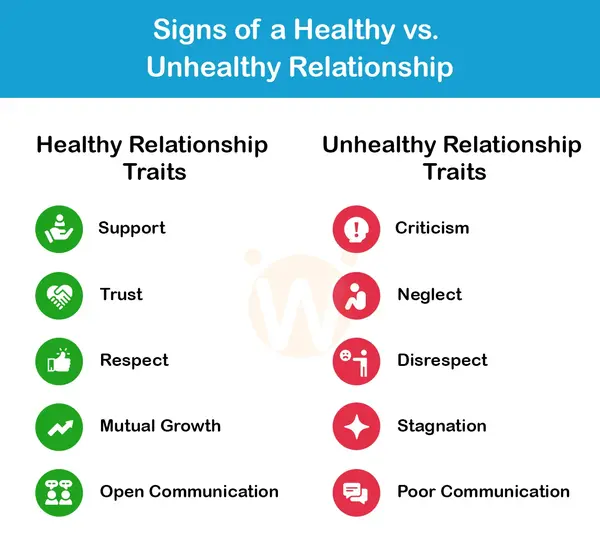
It’s crucial to identify the signs of unhealthy relationships, especially for individuals dealing with mental illness. Toxic relationships can exacerbate mental health issues, leading to a downward spiral of emotional distress.
Signs of Toxic Relationships
- Constant Criticism and Disrespect: Regularly facing criticism and lack of respect can erode self-esteem and worsen mental health conditions.
- Lack of Support: A partner who is unsupportive or dismissive of your mental health struggles can increase feelings of isolation and depression.
- Controlling Behaviors: Being in a controlling relationship can lead to anxiety and a sense of helplessness, significantly impacting mental well-being.
- Neglect and Emotional Unavailability: Persistent neglect or emotional unavailability from a partner can lead to feelings of unworthiness and aggravate mental health conditions like depression.
- Frequent Conflicts and Hostility: Constant conflicts without resolution can create a stressful environment, exacerbating anxiety and other mental health issues.
Also Read: How to Love Your Spouse Again? | How to Fall Back In Love With Your Partner?
Strategies for Maintaining Mental Health in Relationships
Navigating relationships while managing mental health can be challenging, but there are effective strategies that can help. Here are some practical tips for maintaining mental health within relationships:
- Open Communication:
- Engage in honest and open communication with your partner.
- Share your feelings, concerns, and needs in a clear and respectful manner.
- Listen actively to your partner’s perspective, fostering a deeper understanding and connection.
- Seek Professional Help:
- Consider couples therapy or individual counseling to work through relationship challenges.
- Therapy can provide tools for better communication, conflict resolution, and understanding each other’s mental health needs.
- Wellness Hub offers a range of online counseling services that can be accessed from the comfort of your home.
- Set Healthy Boundaries:
- Clearly define personal boundaries in the relationship.
- Respect each other’s limits to ensure mutual comfort and trust.
- Prioritize Self-Care:
- Engage in self-care activities to manage stress and maintain your mental well-being.
- Activities like exercise, mindfulness, and relaxation techniques can be beneficial.
- Build a Support System:
- Maintain connections with friends and family for emotional support outside the relationship.
- A strong support system can provide a balanced perspective and additional resources when needed.
Strategies for Maintaining Mental Health in Relationships
| Strategy | Description | Benefit |
|---|---|---|
| Open Communication | Encourage honest and empathetic dialogue to express feelings and understand each other’s needs. | Enhances mutual understanding, reduces misunderstandings, and strengthens trust. |
| Seeking Professional Help | Engage in couples therapy or individual counseling to address relationship challenges and mental health issues. | Provides expert guidance, improves communication skills, and helps resolve conflicts effectively. |
| Setting Boundaries | Clearly define personal limits and respect each other’s space, needs, and comfort levels. | Fosters a healthy, respectful relationship environment, and ensures individual well-being. |
| Self-Care | Prioritize personal well-being through activities like exercise, meditation, and hobbies. | Reduces stress, improves mood, and maintains a balanced mindset, positively impacting the relationship. |
| Building a Support System | Maintain connections with friends, family, and community for emotional support outside the relationship. | Offers a broader perspective, additional emotional support, and reduces dependency on a single relationship. |
The Role of Wellness Hub
Wellness Hub plays a significant role in supporting mental health in relationships. Understanding the complexities of managing mental health within the dynamics of a relationship, Wellness Hub offers a variety of tools and resources to help individuals and couples build and maintain healthy relationships, even when facing mental health challenges.
How Wellness Hub Can Help:
- Resource Center:
- Explore articles, tips, and advice on mental health and relationships.
- Find insights on how to navigate complex emotions and maintain healthy interactions.
- Professional Support:
- Access to experienced therapists who specialize in couples counseling and individual mental health.
- Online sessions provide flexibility and privacy, accommodating your needs and schedule.
- Tools for Relationship Building:
- Utilize interactive tools and exercises designed to improve communication and understanding in relationships.
- Engage in activities that strengthen emotional bonds and mutual support.
- Educational Workshops and Webinars:
- Participate in online workshops that focus on building resilience in relationships and managing mental health challenges together.
By leveraging the resources and support offered by Wellness Hub, individuals and couples can navigate the complexities of mental health in relationships more effectively. Whether you’re seeking advice, professional counseling, or interactive tools, Wellness Hub provides comprehensive support to enhance both mental health and relationship well-being.
Conclusion
As we conclude our exploration of “Mental Health and Relationships: Understanding the Connection,” it’s clear that the intricate link between our emotional well-being and our interpersonal connections is undeniable. Our journey through this topic has underscored several key points:
- The Two-Way Street: Mental health and relationships influence each other in significant ways. While our mental state can shape the quality of our interactions, the health of our relationships can have a profound impact on our mental well-being.
- Importance of Communication: Open, honest communication and understanding are vital in nurturing healthy relationships, which in turn support our mental health.
- Professional Help: Seeking professional advice, whether through counseling or therapy, can provide invaluable support in addressing challenges that arise at the intersection of mental health and relationships.
- Self-Care and Support Systems: Prioritizing self-care and building a robust support system are crucial steps in maintaining both relationship health and mental equilibrium.
As we navigate the complexities of mental health in our relationships, remember that challenges are a part of the journey, but they do not define the destination. There is always hope, and resources are available to guide and assist us through the rough patches.
We at Wellness Hub are dedicated to providing you with the support and tools you need to navigate these aspects of your life. Whether you’re seeking guidance, resources, or professional counseling, we’re here to help. We encourage you to explore our website, Wellness Hub, for more information and support on managing mental health in your relationships.
Frequently Asked Questions:
1. How Does Mental Health Affect Relationships?
Mental health significantly impacts relationships. Challenges like anxiety or depression can lead to communication barriers, misunderstandings, and emotional distance. Conversely, positive mental health fosters better understanding, empathy, and stronger bonds in relationships.
2. Can Relationship Problems Cause Mental Health Issues?
Yes, relationship problems can contribute to mental health issues. Continuous conflicts, lack of support, or toxic dynamics in a relationship can lead to stress, anxiety, and depression.
3. What Are Healthy Boundaries in Relationships with Mental Illness?
Healthy boundaries in relationships with mental illness involve clear communication of needs and limits, respecting each other’s space, and understanding emotional and physical limits. It’s about creating a safe, supportive environment for both partners.
4. How Can I Support My Partner with Mental Health Challenges?
Supporting a partner with mental health challenges involves active listening, showing empathy, encouraging them to seek help if needed, and being patient. It’s also important to take care of your own mental health in the process.
5. Is Couples Therapy Beneficial for Mental Health Issues?
Couples therapy can be highly beneficial for addressing mental health issues within a relationship. It provides a safe space to understand each other’s perspectives, learn effective communication strategies, and work through relationship challenges together.
6. Where Can I Find Resources for Improving Mental Health in My Relationship?
Resources for improving mental health in relationships can be found at Wellness Hub. Visit Wellness Hub’s website for articles, counseling services, and tools designed to support both mental health and relationship well-being.
7. How Can I Discuss My Mental Health with My Partner?
Discussing mental health with your partner involves choosing a comfortable setting, being honest about your feelings and experiences, and using clear, direct language. It’s also important to be open to questions and provide resources for your partner to understand better.
8. What Are the Signs of a Toxic Relationship for Someone with Mental Illness?
Signs of a toxic relationship for someone with mental illness include constant criticism, lack of support for mental health challenges, controlling behavior, emotional manipulation, and causing feelings of worthlessness or increased anxiety and depression.
9. How Can I Manage Anxiety in My Relationship?
Managing anxiety in a relationship involves open communication about your anxieties, practicing self-care, seeking professional help if needed, and establishing healthy boundaries. Mutual understanding and support are key.
10. What Steps Can I Take to Cope with Depression in My Partnership?
Coping with depression in a partnership requires open dialogue about your feelings, seeking professional help, engaging in activities that bring joy, ensuring self-care, and asking for support from your partner in managing day-to-day tasks.
About the Author:
Prapoorna Mangalampalli
M.Sc., M.A., (Dual Masters in Psychology & English) – Counselor (6+ years of experience)
Prapoorna armed with a passionate dedication fueled by dual Master’s degrees in Psychology and English, Prapoorna sheds light on and elevates human experiences. Over 6+ years of experience fuel her insightful approach to counseling, offering profound empathy and guidance across diverse areas like online, marital, relationship, child, family, and career counseling.
At Wellness Hub, she thrives in a team environment that values innovation, compassion, and achieving results for their clients.
Connect with Prapoorna to learn how she can help you or your loved one find their voice and build a brighter future.
Book your Free Consultation Today
Parent/Caregiver Info:
Client’s Details:
* Error Message





